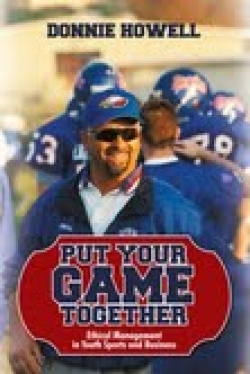Put Your Game Together
This earnest, passionate book about the importance of youth sports programs for kids will leave readers feeling as though they know author Donnie Howell personally. His anecdotal narrative ranges freely over the varied terrain of childhood struggle, playing football, coaching it, and how his coaching philosophies translate easily into ethical business practices. Howell’s dedication to improving kids’ lives infuses every page with commonsense wisdom that will inspire everyone who works with kids, either professionally or as a volunteer. Conscious that coaches can either encourage or demean players, Howell outlines a fully developed approach to working with young athletes that goes far beyond what they do during practice or at a game.
Consistency is the base of Howell’s program, and making practice fun is the “creative marketing” that keeps kids coming back every year. Young people need predictability in school and extracurricular activities, especially when their home lives are troubled or difficult. Fairness, structure, and making a chance for everyone to play are Howell’s essential ingredients for effective coaching that can change kids’ lives. Community leaders, school administrators, educators, and parents all have a role in Howell’s vision, because their support will create “long-term players and supporters in the community.”
Well-run sports programs can turn rotten days into good ones that eventually add up to long-term success. Howell compares having a “mean yelling guy for a coach” to one who offers constructive criticism and a team-oriented philosophy. Only positive motivation can help kids learn, improve, and “move on to the next level” in their sport. Giving in to the “pressure of winning” causes coaches to treat players badly, abandon “ethics and principles” and forget why they wanted to coach in the first place.
Howell places special emphasis on the challenges coaches face when confronted with assistant coaches whose egos demand victory at all costs, forgetting that working with other people’s children is “an honor.” He also censures parents who want special privileges for their children and reprimands those who place undue pressure on their children. At the same time, however, parents should advocate for their children’s fair treatment because the coach’s primary job is to teach the sport. Even more importantly, teaching the sport should take precedence over winning games.
As budget cuts threaten schools and extracurricular programs across the country, Howell provides compelling reasons for maintaining sports programs. In an era of single parents and long work hours, after-school athletics can help to fill afternoons with positive experiences that keep kids off the streets, off drugs, and in school.
Reviewed by
Elizabeth Breau
Disclosure: This article is not an endorsement, but a review. The publisher of this book provided free copies of the book and paid a small fee to have their book reviewed by a professional reviewer. Foreword Reviews and Clarion Reviews make no guarantee that the publisher will receive a positive review. Foreword Magazine, Inc. is disclosing this in accordance with the Federal Trade Commission’s 16 CFR, Part 255.

